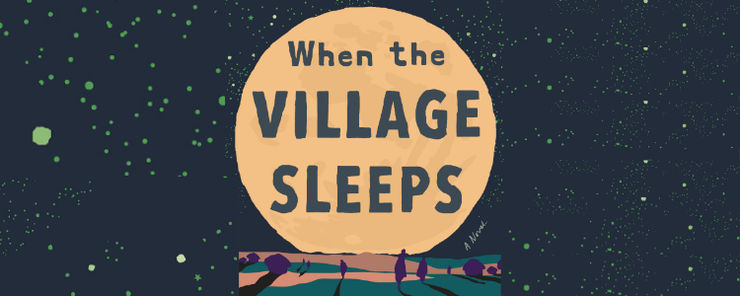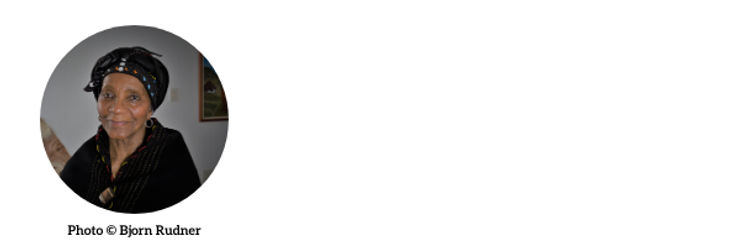Author Q&A: When the Village Sleeps, a new novel from the legendary Dr Sindiwe Magona
"Timely and truthful, this novel is vintage Sindiwe Magona, one of our wisest voices. Few capture the contemporary black South African female experience with such power and resonance. The voices of her protagonists linger in one’s mind long after the reading of this book." – Elinor Sisulu

When the Village Sleeps is a visionary novel about what the loss of identity and dignity do to a people afflicted by decades of brokenness. Told through the lives and spirits of four generations of amaTolo women, including The Old, who speak wisdom with ever-increasing urgency, it moves between the bustling township setting of Kwanele and the different rhythms of rural village life. It is an ode to the complex strengths of South African women, and a powerful call to respect the earth that nurtures human life, and to live in self-sufficiency and harmony with the environment and each other.
We spoke to Dr Magona about her extraordinary new novel, the strength and courage of woman, importance of rites of passage for young people and her role as a writer, writing for different generations.
One can’t help but not think about the African Proverb "it takes a village to raise a child" when reading the title of the book. Was the title inspired by this proverb?
Yes, it was. In the novel itself, this proverb is evoked. Our proverbs encapsule the wisdom of our ancestors. They may not have left us written instructions about life and how it should be lived … all that is in these proverbs. This one, in particular, underscores the vital importance and inevitability of the oneness of all humanity; and points to the inescapable responsibility that is the present cohorts of parents, in community, should and must pass on what lessons it has learnt from its predecessors.
When the Village Sleeps was inspired by an article you encountered in a local newspaper (and the novel has formed part of your PhD thesis), what about this particular story or article moved you?
That a mother had intentionally maimed her unborn child horrified me. I blamed her; blamed her mother; blamed the school, the church, and all and every adult in the midst of whom she was growing. She had planned the pregnancy from age 13 and had the baby at 16. ‘I used to drink before I got pregnant,’ she said in the article; and went on to say, ‘But after I got pregnant, I started taking drugs!’ Yes, it took me some time, but the story would not leave me and, by and by, I moved from blame to realization I was part of the problem. For decades, Fetal Alcohol Syndrome (FAS) has been a problem in South Africa and this was a variation thereof. Yes, FAS may not be as intentional and calculated as in this case; but no mother could ‘accidentally’ have more than one FAS child without cottoning on to what was amiss. Currently, South Africa leads the rest of the world in FAS incidents. It is mind-boggling that so many people’s lives are ruined and the country or nation goes on with business as usual. What would constitute a national disaster?
What do you hope the reader takes away from this extraordinary book?
That none of us can be a spectator in life; we all have innate abilities which are needed on earth to make life for all, a good life. In each generation, the cohort of parents have a duty to pass on to the succeeding generation what it received from the preceding one. The adults have a collective responsibility for the children of this country … they are ours in community and the distress in which the young wallow should be the business of the entire nation, not just the biological parents or guardians.
The grandmother, Khulu is a woman of strength, wisdom and immense courage and drives a lot of redemption in the story - do you think older people are being increasingly disregarded or left behind in our current landscape?
Whether they are left behind or have absconded – that is the question. But it is clear there is a disjuncture between the generations – a great pity. Each has a lot to learn from the other, a lot to give or teach to the other; mutual enrichment, so to speak.
Please tell us a little more about the voices of The Old, whose haunting poetry is so much part of the story.
Most, if not all, African people believe in the ancestors – that those who have left this plane, the flesh life, have gone to the spirit world. From there, they continue the important roles they held while in flesh, inter alia: protector, advisor, guide, etc. Our clan names attest to this belief and we perform rituals to honour and keep in touch with our ancestors. Unlike guardian angels, ancestors are communal, not personal. When a thought or inkling suddenly strikes a person and it turns out to their good fortune to have followed that thought, we say, ‘Ube namawabo! Their ancestors were present.’ Those of other cultures would subscribe such to sheer good fortune perhaps. An aside: How many refugees hold Pepsi Cola bottles in their hands? Why did one 17-year-old see ‘Made in South Africa’ and decide that is where he should head? Today, he is one of the country’s leading COVID-19 doctors. Ancestors at work!
Please tell us more about your thoughts on the importance of the rites of passage for young people?
These are not a one-day affair but continues from birth till death. In the young: the naming ceremony is the first and, through storytelling and observing what happens around them, the young are aware of what lies in store for them … look forward to it (mostly, if in awe sometimes). On reaching puberty, the girl is honoured with intonjane, the ceremony announcing to the entire village she no longer is a girl but a woman. In the pre-formal education days, this meant she was marriageable – of course, this is different today. The casual ‘education’ the girl has been undergoing from when she was still a toddler is now formalised. She has been doing chores but now this is all related to her future role as wife, daughter-in-law, mother, and a member, fully grown, of her village. She is taught how these tasks that will be hers should be fulfilled with diligence and how what she does has import for not only herself and her new family but her birth family as well and, indeed, the village. The do's and dont's and reasons thereof are explained. Sexual education has been discussed since she was old enough to know she is not a boy but a girl – which was easy to recognise in the villages of even my childhood: a girl wore inkciyo while, for most times, the little boy just walked about without that. This too has changed. Play sex, allowed and encouraged till this stage stays on. Real sex, or sex with penetration strictly forbidden 'till she becomes a man’s wife. How to mind her body, including when pregnant; nursing a child; ready for becoming pregnant … Parenting is paramount in raising a wholesome village and the village of old ensured responsible parenting in ways that worked then. It is a great pity we have not taken the aim behind these practices seriously enough to weave them into today’s living. It is only when parenting happens when people are ready and prepared to shoulder that responsibility that it can have even the slightest chance of success.
You write a lot about the political, cultural and social context of our world, with a particular focus on women's issues. What do you hope women will learn from your story and stories?
That only by being active agents in their own lives will they have any chance of having a life worth living, the good life that each and every human being deserves.
Your writing career spans from the 1990s to democratic South Africa, how do you see your role as a writer, writing for different generations?
My writing is my response to this ever-changing world. Therefore, although I may refer to the past, the time of my earlier years or even further back than that, it is always and ever the present that consumes me … and the future it will or may birth.
If you were to give a single piece of writing advice, what would it be?
Read! Read! Read! Read, of course, the successful authors or those you most admire. But read the less successful ones too – they too will teach you something.
What’s the first book you fell in love with or keep returning to?
Hatter’s Castle. Perhaps because my idol, older brother, praised it. I loved the hatter’s daughters and his wife and really felt sad and sorry for them and kept hoping they would escape his cruelty. I go back to this book for the simple joy of a good read and the sweetness of those girls.

Dr Sindiwe Magona is an author, storyteller, motivational speaker, poet, playwright, and actor. She has received numerous literary awards as well as awards in recognition of her work around women’s issues, the plight of children, and the fight against apartheid and racism. Dr Magona recently received the Ellen Kuzwayo Award as well as her third honorary doctorate, from Nelson Mandela University. She lives and works in Cape Town.